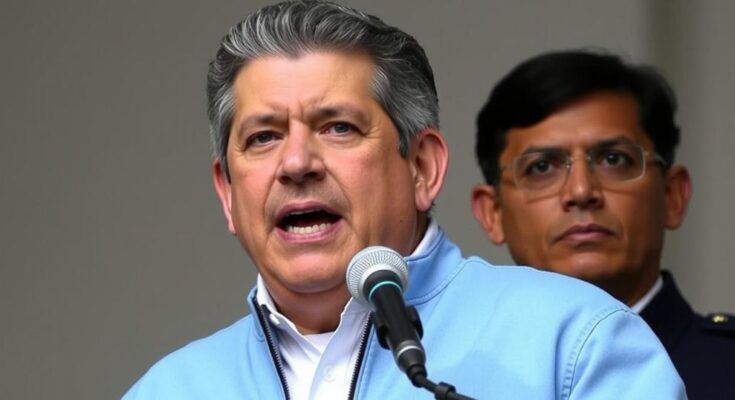Nicolás Maduro was sworn in for a third term in Venezuela amid controversy over allegations of electoral fraud and significant international condemnation. Despite claims of a democratic victory, opposition leaders assert that legitimate elections were not held in July. The inauguration was Boycotted by many democratic leaders, and ongoing public opposition suggests a turbulent path ahead for Maduro’s regime.
Nicolás Maduro has been inaugurated for a third term as Venezuela’s president despite significant domestic backlash and widespread international condemnation concerning alleged election theft. During a sparsely attended ceremony in Caracas, where many democratic leaders boycotted the event, Maduro proclaimed, “This is a great victory for Venezuelan democracy.” Yet, his government has faced accusations of failing to substantiate claims of victory in the 28 July elections, where opponents assert the true winner was Edmundo González, citing extensive evidence of economic dissatisfaction driving public sentiment against Maduro’s regime.
The inauguration was characterized by a stark division, with leftist leaders from Brazil and Colombia conspicuously absent, reflecting their refusal to acknowledge Maduro’s legitimacy. In stark contrast, leaders from authoritarian regimes, including Cuba and Nicaragua, supported his claim. Maduro’s lengthy address painted him as a champion of a democratic revolution, asserting his legitimacy by stating, “I come from the people. I am of the people.” However, he faced renewed international criticism, even from figures within the left, who branded his administration as dictatorial.
U.S. Secretary of State Antony Blinken expressed solidarity with the Venezuelan populace, reaffirming the need for a return to democratic governance. The United Kingdom’s Foreign Secretary, David Lammy, reiterated that Maduro’s claims of power were fraudulent and highlighted ongoing sanctions against his regime. Brazilian authorities indicated a deterioration in relations with Maduro’s government, further isolating the Venezuelan leader on the world stage.
Despite the challenges, Maduro continues to receive backing from the military and security forces, reinforcing his grip on power. In response to his inauguration, Venezuelan opposition leaders have vowed to persist in their resistance against his authority through peaceful means. Juan Pablo Guanipa, an opposition figure, emphasized the need for unity and non-violent struggle, asserting, “Venezuela will triumph! It is time to resist!” These developments underscore the heightened tensions surrounding Maduro’s leadership, illustrating the complex political landscape within Venezuela.
Nicolás Maduro has been at the center of controversy since his initial election in 2013. The current political situation in Venezuela has been marked by severe economic decline leading to widespread public unrest. Allegations of electoral fraud in the 2024 presidential elections have fueled protests and opposition movements within the country. The international community, including various nations in Latin America, has largely denounced Maduro’s increasingly authoritarian governance, which has severely restricted political dissent and basic human rights. The ongoing conflict between Maduro’s regime and the Venezuelan opposition continues to shape both domestic and international responses to Venezuela’s political crisis.
The inauguration of Nicolás Maduro amid protests and international disapproval highlights the ongoing struggles surrounding Venezuelan governance and democracy. His regime’s claims of legitimacy are repeatedly challenged by evidence of election fraud and widespread resistance from opposition leaders. While Maduro maintains power through military support, the voices calling for democracy and accountability grow stronger, indicating a potential for future change. The situation remains fluid, requiring continued scrutiny from both national and international observers.
Original Source: www.theguardian.com




